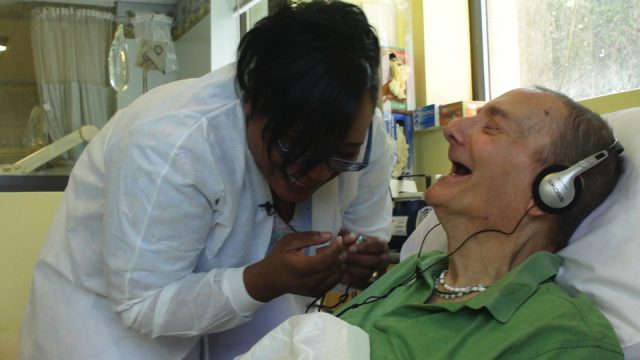
Image courtesy of Michael Rossato-Bennet
Over the past year we have been working with Music & Memory, which is an organization we really admire. We thought it would be a neat idea to showcase them a bit, so Geoff had a short interview with Justin Russo, the Communications Director of Music & Memory, who explains what they do.
Geoff Birmingham: What is Music & Memory and whom does it serve?
Justin Russo: Music & Memory is a non-profit organization that trains elder care professionals and caregivers to bring personalized music to those with dementia and a variety of physical and cognitive issues through the use of digital technology. Typically, we provide autobiographical music via customized playlists on iPods.
Our organization was created as a 501(c)(3) non-profit organization in 2010. The idea began in 2006 when founder Dan Cohen began to set up personalized playlists for residents while volunteering at local long-term care organizations. Since then, Music & Memory has implemented personalized music programs in thousands of certified care organizations throughout the US, Canada and abroad.
GB: What is personalized music?
JR: By personalized music, we mean autobiographical music, or music that people have a direct personal connection with, usually what they listened to and enjoyed when they were younger.
Cognitive neuroscience tells us that music is processed in the pre-frontal cortex, where memories are also stored. All of us have had the experience of smelling something that brings back strong memories, and the same applies to music that we know and loved from our past. This can be very powerful for someone suffering from Alzheimer’s or dementia. A familiar tune can bring back memories and awaken emotions that were previously inaccessible. Listening to a personalized playlist of favorite music helps connect those with dementia to memories, loved ones, and the world around them.
GB: What role do you see this playing in healthcare for those with dementia?
JR: Music & Memory offers a non-pharmacological, person-centered approach to care that can be utilized in all care settings and all stages of dementia. Persons with dementia can get easily confused, agitated and angry. In situations like these, healthcare providers sometimes rely on drugs to reduce those symptoms. Personalized music often can be substituted for more harmful medications. Reducing the need for drugs allows those with dementia to live a fuller, more meaningful life.
GB: Goals for the future. What we hope for
JR: Our goals for the future include making Music & Memory a standard of care across the United States and abroad to bring the benefits of personalized music to as many people as possible. There are about 16,000 long-term care organizations in the United States, and Music & Memory has thus far brought the program to 3,100 of them. So there is a lot more opportunity for us. We also see opportunities to help other populations, not just seniors with dementia. People with behavioral issues, developmental disabilities, or traumatic brain injuries would also benefit from personalized music. It really can help a lot of people.